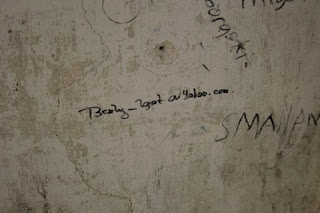
The underdog is evident as their band collections are wrapped around the top of their palms.
Quezon again. We chanced upon these kids playing a game with goma (rubber bands) on a flat piece of plywood outside their home. It is like the goma version of pick-up sticks! It is interesting to watch children go about a game, not speaking and with ease. The proportions of their paraphernalia are suited to their size, and they show a dexterity that has not the grace of older ladies. There's a video at the bottom that's worth a peek at.

Setting up one bunch, with equal contributions of rubber bands from both parties.

Setting up a second batch so they could go right in after the first round.

After palming the bunch (to make sure the bands are firm into each other for a challenge), they get right on to flicking the bands off.

Whichever bands get separated from the bunch can be kept by the flicker.

The undisputed queen of larong goma.

Such a beautiful and intimidating way to keep the heads you hunt.































